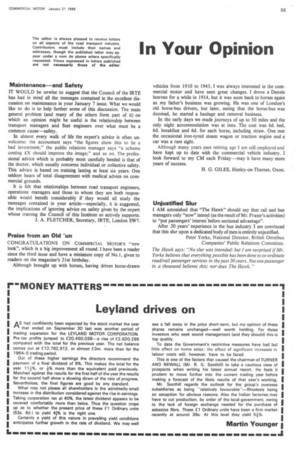In Your Opinion
Page 57

If you've noticed an error in this article please click here to report it so we can fix it.
Maintenance—and Safety
IT WOULD be unwise to suggest that the Council of the IRTE has had in mind all the messages contained in the excellent discussion on maintenance in your January 7 issue. What we would like to do is to help further some of this discussion. The main general problem (and many of the others form part of it) on which an opinion might be useful is the relationship between transport managers and fleet engineers over what must be a common cause—safety.
In almost every walk of life the expert's advice is often unwelcome: the accountant says "the figures show this to be a bad investment;" the public relations manager says "a scheme costing £X should improve the image;" and so on. The professional advice which is probably most carefully heeded is that of the doctor, which usually concerns individual or collective safety. This advice is based on training lasting at least six years. One seldom hears of total disagreement with medical advice on commercial grounds.
It is felt that relationships between road transport engineers, operations managers and those to whom they are both responsible would benefit considerably if they would all study the messages contained in your article—especially, it is suggested, the implications of ignoring advice on safety given by the expert whose training the Council of this Institute so actively supports.
J. A. FLETCHER, Secretary, IRTE, London SW7.
Praise from an Old 'un
CONGRATULATIONS ON COMMERCIAL MOTOR'S "new look", which is a big improvement all round. I have been a reader since the third issue and have a miniature copy of No.1, given to readers on the magazine's 21st birthday.
Although brought up with horses, having driven horse-drawn vehicles from 1910 to 1943, I was always interested in the commercial motor and have seen great changes. I drove a Dennis boxvan for a while in 1914, but it was soon back to horses again as my father's business was growing. He was one of London's old horse-bus drivers, but later, seeing that the horse-bus was doomed, he started a haulage and removal business.
In the early days we made journeys of up to 50 miles and the only night accommodation was at inns. The cost was 6d. bed, 6d. breakfast and 6d. for each horse, including straw. One met the occasional iron-tyred steam wagon or traction engine and a car was a rare sight.
Although many years past retiring age I am still employed and have kept up to date with the commercial vehicle industry. I look forward to my CM each Friday—may it have many more years of success.
H. G. GILES, Henley-on-Thames, Oxon.
Unjustified Slur
I AM astonished that "The Hawk" should say that rail and bus managers only "now" intend (as the result of Mr. Fraser's activities) to "put passengers' interest before sectional advantage". After 20 years' experience in the bus industry I am convinced that this slur upon a dedicated body of men is entirely unjustified. Peter Yorke, National Director, British Omnibus Companies' Public Relations Committee.
The Hawk says: "No slur was intended; but I am surprised if Mr. Yorke believes that everything possible has been done to co-ordinate road/rail passenger services in the past 20 years. Not one passenger in a thousand believes this; nor does The Hawk."




















































































































